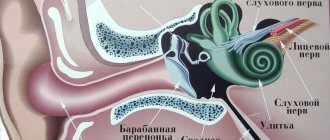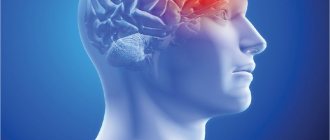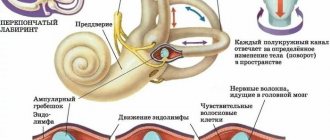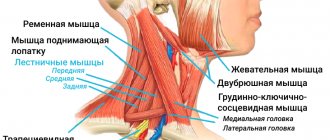Complaints of dizziness when bending over can be present in a variety of pathologies. But in the vast majority of cases, this is a classic symptom of circulatory or innervation disorders. Also, a malfunction of the vestibular apparatus may manifest itself in a similar way. But, again, this may be directly related to pathologies of blood vessels, cranial nerves and the cervical spine.
Dizziness when tilting the head is a manifestation of oxygen deficiency due to a decrease in the level of blood flow through the cerebral blood vessels. Brain tissues are highly sensitive to glucose and oxygen deficiency. They are delivered by red blood cells through arterial blood flow.
Blood supply to the brain structures is carried out using four paired arteries. Two sleepy ones are located on the sides of the neck. The two posterior vertebrates pass within the uncovertebral processes along the lateral sides of the cervical vertebral bodies. The carotid arteries supply blood to the lateral and anterior lobes of the brain. The posterior vertebral arteries are responsible for the blood supply to the optic and auditory nerves, the vestibular apparatus, and the posterior lobes of the brain.
When blood flow is disrupted, the following occurs:
- free radicals and breakdown products accumulate in cells;
- ischemia begins at the cellular level;
- When a significant number of cells die, a cerebral infarction develops.
The first clinical sign of cerebrovascular insufficiency is dizziness when tilting the head in different directions. We will tell you what reasons can provoke this condition in the article we bring to your attention. It also describes the main clinical symptoms, when they appear, you should immediately call an ambulance. If you experience dizziness, try to see a neurologist as soon as possible.
In Moscow, you can make an appointment right now with an experienced neurologist in our manual therapy clinic. The first consultation is provided to each client completely free of charge. During the appointment, the doctor will conduct an examination and make a preliminary diagnosis. If necessary, he will recommend additional examinations. After an accurate diagnosis is made, the patient will be prescribed an individual course of therapy.
Causes of dizziness when tilting your head down
Dizziness when tilting your head down is a sign of vertebrobasilar insufficiency. This is a pathological condition in which, due to changes in the course of the posterior vertebral arteries, any change in the position of the head provokes a lack of blood supply to the structures of the brain.
The main cause of dizziness when tilting the head is degenerative dystrophic changes in the cartilaginous tissues of the intervertebral discs. This is osteochondrosis and its negative consequences, such as instability of the position of the vertebral bodies, protrusion, extrusion and disc herniation.
Let's try to analyze these causes of dizziness when bending down in more detail. Let's start with the principle of blood supply to cerebral structures. Arterial blood enters the systemic circulation from the left ventricle. Movement along the aorta begins. Then branching into smaller arteries occurs. One of the branches of the subclavian artery goes to the space between the sixth and seventh cervical vertebrae. Here it comes out and, moving along the uncovertebral hook-shaped processes, reaches the oval opening in the cranium. This is where the extracranial section of the artery ends. After entering the cranium, the intracranial section of the artery begins. It can also be subject to stenosis due to some negative factors.
The cervical spine is characterized by increased lability, due to which a person can make a wide variety of head movements. Neck mobility is ensured by the special structure of the vertebral bodies and relatively high intervertebral discs. There is no disc between the first and second cervical vertebrae. They are connected to each other using a joint. This provides greater mobility, but can also cause a lot of trouble. Very often, modern people are diagnosed with subluxation or dislocation of the first cervical vertebra. This has an extremely negative impact on the state of brain structures. Such people often suffer from symptoms of increased intracranial pressure.
The cervical vertebrae have three types of processes:
- arcuate - they, together with the vertebral bodies, form the oval opening of the spinal vertebral canal;
- spinous - responsible for protecting and ensuring the performance of the locomotor system;
- uncovertebral - form a kind of canal along the lateral surfaces of the cervical vertebrae to protect the posterior vertebral arteries.
All structural tissues of the cervical spine are balanced and provide complete protection to the spinal cord structures, radicular nerves and cerebral blood vessels.
What happens with the development of cervical osteochondrosis:
- the cartilaginous tissues of the intervertebral discs do not have their own circulatory network; they receive fluid and nutrients dissolved in it only with the active contractile work of the surrounding muscles;
- if a person is engaged in sedentary work with prolonged tension in the neck muscles, then the diffuse nutrition of the cartilage tissue of the fibrous ring is disrupted;
- it begins to take fluid from the nucleus pulposus located inside it;
- the corpus pulposum loses its mass and loses its ability to maintain the normal height of the intervertebral disc;
- this creates conditions for instability of the position of the vertebral bodies, they begin to shift relative to their axis;
- pressure is exerted on the radicular nerves and their branches;
- in response, an inflammatory reaction develops and a pain syndrome appears with muscle fiber tension;
- it fixes the incorrect position of displaced vertebral bodies;
- against this background, there is a change in the patency of the posterior vertebral arteries towards narrowing;
- The structures of the brain and vestibular apparatus do not receive sufficient arterial blood and the person experiences so-called orthostatic dizziness.
There are other causes of dizziness when tilting the head down, in particular, they include:
- use of certain medications without a doctor’s prescription;
- intoxication, including alcohol or nicotine poisoning (after smoking);
- inflammation of the neck muscles in the area of the carotid or posterior vertebral arteries;
- heart and vascular failure;
- atherosclerosis of cerebral vessels with the formation of cholesterol plaques;
- diabetes mellitus accompanied by diabetic angiopathy;
- damage to paired cranial nerves, causing spasm of blood vessels;
- high levels of cortisol, adrenaline and other stress hormones in the human body;
- arterial hypertension;
- liver and kidney failure;
- high level of intracranial pressure;
- tumor processes;
- inflammation of the middle ear, etc.
Only an experienced doctor can exclude all possible causes of dizziness when tilting the head. Therefore, do not ignore this sign, but urgently make an appointment with a neurologist. Remember that in some cases this symptom may indicate the development of an acute cerebrovascular accident. In the event of a stroke, timely medical care allows a person to fully maintain their ability to work and prevent the development of paralysis.
Young people are dizzy
The most common cause of dizziness in this situation in young people is the so-called benign positional vertigo, when the problem occurs with sudden changes in head position. Here it is worth understanding that when many people are afraid of a stroke against the background of severe dizziness, it is precisely a rare cause of this symptom.
Question answer
Why do you often feel dizzy? Benign positional vertigo is a condition where the problem occurs in the peripheral part of the vestibular system. The latter is, in simple terms, a kind of sac and three semicircular tubules located in different planes. This sac contains small pieces of otolith - this is an accumulation of calcium like small pebbles. Sometimes such pebbles can come out of this sac and end up in some, most often posterior, tubule. And when a person turns his head in the plane where the pebble hit, severe dizziness appears. If a person feels dizzy only when turning in any direction and there is a position where she does not feel dizzy at all, then most likely this is benign positional vertigo, and not a stroke, as everyone often thinks.
When help is needed urgently
There are situations when a patient needs help urgently, otherwise he may begin to develop irreversible consequences. We are talking about a violation of cerebral circulation. It can be transient (transient) or permanent, ischemic or hemorrhagic.
With a transient disturbance of cerebral circulation, severe dizziness occurs when bending over, which completely disappears when the previous position of the skull is restored. It is due to the fact that when the position of the vertebral bodies changes, the movement of blood through the posterior vertebral arteries is disrupted. As a result, dizziness, nausea, throbbing headache, and spots in the eyes may occur. If such symptoms appear, a visit to a neurologist should be made within 72 hours. Each subsequent attack can lead to a full-fledged ischemic stroke of the brain.
It is worth considering that the causes of dizziness when bending over in women may be associated with menopausal hormonal changes in the body. The fact is that a certain balance of hormones guarantees reliable protection against myocardial ischemia and cerebral structures. Therefore, cerebral and coronary circulatory disorders are extremely rarely diagnosed in women of reproductive age. They practically never have strokes or heart attacks. The situation changes dramatically after a woman reaches the age when menopause occurs. Hormone levels change, processes begin that lead to changes in platelet aggregation. The blood becomes thick and viscous. The risk of sudden stroke or heart attack increases sharply.
Therefore, severe dizziness when tilting the head in a woman over 50 years of age is a reason to urgently call an ambulance team.
Severe dizziness when bending down may be accompanied by nausea and vomiting - these are signs of damage to brain structures. Pay attention to facial expressions - if an asymmetric contraction of the facial muscles is visible, then this is also a reason to urgently seek medical help. In principle, dizziness is an extremely dangerous clinical symptom. This is how various types of neoplasms begin to appear at an early stage. If you undergo diagnosis and treatment in a timely manner, the chances of recovery are very high. Therefore, do not ignore such symptoms, seek help from a neurologist.
Dehydration
People who are dehydrated at night may sometimes wake up feeling dizzy. Here are other signs of dehydration that you may experience in addition to dizziness:
- thirst
- fatigue
- headache
- dry mouth and lips
Here are the reasons why you may be dehydrated:
- not drinking enough fluids during the day
- sleeping in a hot environment
- excessive alcohol consumption
- illnesses that cause vomiting and diarrhea
- taking medications that cause frequent urination
- drinking too many caffeinated drinks, which makes you urinate more often
What to do if you feel dizzy when tilting your head
If you experience dizziness when bending forward, the first thing to do is to stabilize yourself and eliminate the possibility of falling. Therefore, if possible, you need to sit or lie down. If this is not possible, lean your back against a vertical surface. Start breathing deeper. Release the pressure from your collar or tie. It is important to provide the brain with a sufficient amount of arterial blood.
If dizziness occurs repeatedly when tilting your head forward or backward, then get examined:
- make an appointment with a neurologist;
- take an x-ray of the cervical spine;
- undergo an MRI and ultrasound examination;
- donate blood for a biochemical analysis to determine the level of sugar, cholesterol, protein, lipids, urea and creatinine.
After making an accurate diagnosis, the neurologist can prescribe a consultation with an angiosurgeon, therapist, etc. Treatment is carried out for the disease that causes dizziness when tilting the head back or forward. By itself, this clinical symptom is useless to treat. Such measures will not lead to anything good. We need to find the cause and eliminate it. Only in this case the patient receives guaranteed relief from the unpleasant manifestations of the disease.
If you are periodically bothered by dizziness when tilting and turning your head, we recommend making an appointment with a neurologist at our manual therapy clinic in Moscow right now. Fill out the doctor appointment form located further down the page. The administrator will contact you and agree on all the details of the upcoming visit to the doctor.
How you can help yourself during an attack
The treatment plan for dizziness depends on what disease has been diagnosed. Serious pathologies are treated comprehensively, using all known achievements of traditional and alternative medicine. If dizziness appears suddenly, you can stop the attack with the help of several effective folk recipes, therapeutic massage and gymnastics.
If you feel dizzy when you lie on your back, fresh ginger will help. Cut a thin slice of the root and chew slowly without drinking any liquid. The product will help you cheer up and eliminate nausea.
You can alleviate or completely eliminate the symptoms of poor health with the help of aromatic herbal tea based on medicinal plants.
You will need:
- Dried mint leaves – 100 grams.
- Dry peony root – 50 grams.
- Dried linden flowers – 100 grams.
Directions for use: Mix the ingredients thoroughly, then place two tablespoons of the mixture in a thermos and pour two glasses of hot water. Leave for at least 8-9 hours. The drink should be drunk in 3-4 doses during the day.
Therapeutic exercises and self-massage
You can stop dizziness when you go to bed or change body position with exercises that train the vestibular system. Perform the complex for a few minutes 3-5 times a day and after a while you will notice an improvement in your well-being.
A very effective exercise:
- Take a sitting position on the bed.
- Slowly turn your head to the left.
- Without changing the position of your head, lie down slowly.
- Then sit down slowly, but at the same time turn your head to the right.
- Repeat the exercise with your head turned in the other direction.
Another effective way to relieve dizziness is to massage your temples. Place your index fingers on your temples, and for three to five minutes, perform circular movements in the direction and counterclockwise ten times in each direction. For greater effect, you can massage your earlobes.
How to prevent dizziness
To prevent dizziness from becoming a permanent problem, in addition to treating the diagnosed disease or condition, it is important to adhere to the following rules:
- Go to bed before 23:00 and sleep at least 7-8 hours a night.
- Buy an orthopedic mattress and pillow to prevent spinal diseases.
- Do not read, watch TV or use gadgets while lying down.
- When waking up, do not make jerks or sudden movements.
- Treat hearing diseases in a timely manner.
- Do not overexert yourself, maintain a work and rest schedule.
- Walk regularly, play sports and perform therapeutic exercises.
- Avoid strict diets and eat healthy foods.
- Give up harmful addictions and avoid stress.
Dizziness when getting up and when lying down is a serious reason to take care of your health. Do not wait for the problem to be solved on its own, but start taking all available measures to eliminate it as soon as possible.
Prevention
Lifestyle changes can help prevent or reduce morning dizziness. These changes include:
- drinking plenty of fluids to avoid dehydration
- to give up smoking
- reducing alcohol consumption
- balanced and healthy diet
- avoiding consumption of caffeinated drinks in the evening
- getting enough sleep
- regular physical activity
- reducing and controlling stress
Low blood sugar
If you wake up early in the morning and feel dizzy, this could be a sign of low blood sugar or hypoglycemia. Low blood sugar is more common in people with diabetes, especially those who take insulin, than in people without the disease.
People with diabetes may experience low blood sugar for the following reasons:
- taking too much insulin or other diabetes medications
- skipping meals or eating too little food
- intense physical activity
- excessive alcohol consumption
Here are the symptoms of low blood sugar:
- shaking or tremor
- headache
- fatigue
- blurred vision
- difficulty concentrating or confusion
- excessive sweating
However, anyone can experience low blood sugar, and there may not always be an obvious cause. People who regularly experience symptoms of low blood sugar should see a doctor.
Medications
Some medications may cause dizziness as a side effect. These medications include certain ():
- antibiotics
- diuretics
- opioid painkillers
- antiepileptic drugs
- immunosuppressants
- antidepressants
- neuroleptics
- antiretroviral drugs
If you are taking medications that you think are causing morning dizziness, you should talk to your doctor. Your doctor may recommend changing your dosage or switching to a different treatment.
Labyrinthitis
Labyrinthitis is a viral or bacterial infection of the inner ear that can lead to dizziness. The infection causes inflammation of the delicate structures of the inner ear, or labyrinth, which play an important role in maintaining a person's balance.
Labyrinthitis can sometimes make it difficult for a person to get up or stay upright, especially when getting out of bed.
Here are other symptoms of labyrinthitis:
- earache
- headache
- ringing or buzzing in the ear
- blurred vision or double vision
- nausea or vomiting
Labyrinthitis is most often caused by a viral infection and often occurs after a cold or flu. Treatment usually includes rest and drinking plenty of fluids ().
For people with more severe symptoms, your doctor may recommend medications to reduce dizziness and nausea. If the cause is a bacterial infection, he may also prescribe an antibiotic.











